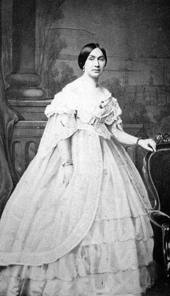 Mississippi Queen, Varina Howell Davis, was not only a Bayou Beauty, but was destined to become the wife of Jefferson Davis, the 1st Lady of the Confederacy and remembered as a refined and dignified Southern Belle. Varina, opinionated and obstinate, grew up in the planter aristocracy of Mississippi, where young women were expected to be silent, demure and subservient in a male dominated society. A tom boy to some, Varina developed from a reckless youth, frolicking in the swamps, into a stunning and captivating Mississippi Bayou Beauty.
Mississippi Queen, Varina Howell Davis, was not only a Bayou Beauty, but was destined to become the wife of Jefferson Davis, the 1st Lady of the Confederacy and remembered as a refined and dignified Southern Belle. Varina, opinionated and obstinate, grew up in the planter aristocracy of Mississippi, where young women were expected to be silent, demure and subservient in a male dominated society. A tom boy to some, Varina developed from a reckless youth, frolicking in the swamps, into a stunning and captivating Mississippi Bayou Beauty.
Varina Banks Howell, the second of eleven children, was born to William Burr Howell and Margaret Louisa Kempe on May 7, 1826 at their home called The Briers, located in Natchez, Mississippi. Her mother was the daughter of a wealthy planter and the father worked as a planter, merchant, politician, postmaster, cotton broker, banker, and military commissary manager, but never secured long-term financial success. He lost the majority of Margaret’s sizable dowry and inheritance through bad investments and their expensive lifestyle. Varina’s childhood was troubled by an insecurity, knowing that the families existence was dependent on the wealth of her mother’s family.
Varina Howell received most of her education at home and developed an acute interest in reading at an early age. She was an excellent scholar and studied at Madame Greenland’s School in Philadelphia during her teens. One of Varina’s classmates was Sara Ellis, the daughter of extremely wealthy Mississippi planters and after the Civil War, as a secure and financially secure widow, Sara Ellis Dorsey, would help support Varina and her family.
Upon her 17th birthday, a very graceful Varina was invited to Hurricane Plantation, the home of Joseph Davis. Her mother, feeling that Varina was now ready to enter Natchez society, permitted the lengthy visit. During her journey, a stop was made at Diamond Place, which was the home of Joseph’s eldest daughter and her husband. While there, a handsome and distinguished-looking caller arrived and was introduced to her. His name was Jefferson Davis; he was Joseph’s younger brother. Jefferson’s visit was not a lengthy one and the only real interaction he had with Varina was to curtly inform her that she was expected at Joseph’s residence the following day.
Varina wrote her mother regarding the encounter with Jefferson Davis,
“I do not know whether this Mr. Jefferson Davis is young or old. He looks both at times; but I believe he is old, for from what I hear he is only two years younger than you are. He impresses me as a remarkable kind of man, but of uncertain temper, and has a way of taking for granted that everybody agrees with him when he expresses an opinion, which offends me; yet he is most agreeable and has a peculiarly sweet voice and a winning manner of asserting himself. The fact is, he is the kind of person I should expect to rescue one from a mad dog at any risk, but to insist upon a stoical indifference to the fright afterward.”
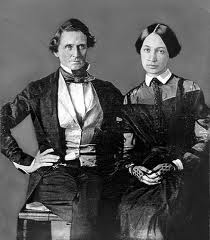 As for Jefferson, he recalled the first meeting between the two as awkward; however, most social interactions were awkward at this point in his life. Davis was taken with her beauty and intelligence, and by the time her visit ended two months later she and Davis were unofficially engaged. He’d spent much of the previous eight years in seclusion at his Mississippi plantation Brierfield, after the untimely death of his wife Sarah Knox Taylor. Margaret Howell, Varina’s mother, objected to the union. She was not convinced that Davis, widowed and eighteen years older than her daughter, was a good match. She thought he was too brooding, and feared that Varina would play second fiddle to his former wife. Eventually, however, she gave in and they were married on February 26, 1845. Her mother’s fears about Davis’s late wife were well founded, on their honeymoon; the newlywed couple paid a visit to her grave. Later in life, Varina would often tell people that she was weary of being compared with the “sainted Sarah.”
As for Jefferson, he recalled the first meeting between the two as awkward; however, most social interactions were awkward at this point in his life. Davis was taken with her beauty and intelligence, and by the time her visit ended two months later she and Davis were unofficially engaged. He’d spent much of the previous eight years in seclusion at his Mississippi plantation Brierfield, after the untimely death of his wife Sarah Knox Taylor. Margaret Howell, Varina’s mother, objected to the union. She was not convinced that Davis, widowed and eighteen years older than her daughter, was a good match. She thought he was too brooding, and feared that Varina would play second fiddle to his former wife. Eventually, however, she gave in and they were married on February 26, 1845. Her mother’s fears about Davis’s late wife were well founded, on their honeymoon; the newlywed couple paid a visit to her grave. Later in life, Varina would often tell people that she was weary of being compared with the “sainted Sarah.”
The newlyweds moved into a two-room cottage on the Brierfield plantation that had been given to Jefferson by his brother. However there was soon tension between the couple, when it was decided that Jefferson’s widowed sister Amanda and her seven children would be moving in with them when their new house was built. This was a decision that was made without Varina’s knowledge. This was just the first hint in their marriage that Jefferson’s family was going to be a problem between the couple. Jefferson’s oldest brother Joseph was particularly controlling. But it wasn’t just Jefferson’s family, Varina’s family also were financially dependent on the couple which caused resentment.
The marriage was also strained by frequent separations. First when Jefferson was campaigning for Congress, and then when he served as an officer in the Mexican-American war. This was a difficult time for Varina; she was forced to return to Brierfield where his brother made her life miserable. When Jefferson returned to Washington, this time as a Senator, Varina couldn’t wait to go with him. Varina had a passion for politics, and as her husband rose in political ranks, she rose in the ranks of Washington society, becoming one of the city’s most popular and also one of its youngest hostesses. Men found her handsome, intelligent and a good listener, while the women were taken by her spontaneity and good humor. For once her intelligence was not a hindrance. When Jefferson Davis was appointed Secretary of War under Franklin Pierce, the couple served as official hosts at the White House in place of the First Couple who were still grieving the death of their young son in a train accident. Her happiness was complete, when after seven long years; the couple had their first child in 1852. Three more children followed in rapid succession. Not everyone was enamored of Varina. She was a strong woman, one with definite convictions, and a caustic wit. Some thought her too forward, especially since she didn’t retire from social life when she was pregnant, which was against the established fashion.
In January of 1861, Jefferson Davis addressed the United States Senate for the last time,
“I rise, Mr. President, for the purpose of announcing to the Senate that I have satisfactory evidence that the State of Mississippi, by a solemn ordinance of her people in convention assembled, has declared her separation from the United States.
Under these circumstances, of course, my functions terminate here. I am sure I feel no hostility toward you, Senators from the North. I am sure there is not one of you, whatever sharp discussion there may have been between us, to whom I cannot now say, in the presences of my God, I wish you well. I go hence unencumbered by the remembrance of any injury received, and having discharged the duty of making the only reparation in my power for any injury offered, it only remains for me to bid you a final adieu.”
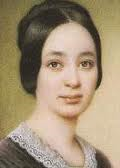 Some say Davis wept after delivering this speech, regardless, he received an ovation and thunderous applause when he was done. Varina was depressed and sad to leave, having spent most of the first fifteen years of her marriage in Washington.
Some say Davis wept after delivering this speech, regardless, he received an ovation and thunderous applause when he was done. Varina was depressed and sad to leave, having spent most of the first fifteen years of her marriage in Washington.
The Davis family and three young children, returned to the family plantation at Brierfield. They were no sooner settled in than the call came for Jefferson to report to Montgomery, Alabama, and accept the nomination for President of the Provisional Government of the Confederates States of America. Varina confided to her mother that the South did not have the resources to win the war, but she had to do her duty.
In May of 1861, Richmond was named the Capital of the Confederacy. Varina, who was expecting their fourth child, renewed a former friendship from her Washington days with noted diarist Mary Boykin Chestnut. The two became inseparable and Mary wrote in her diary of her daily interactions with Varina. Mary’s observations of Varina included the First Lady’s disregard for her wardrobe, unlike her Northern counterpart Mary Todd Lincoln. Mary also made notations that Varina was skilled in managing her time. The First Lady easily directed the servants, took care of her children, visited the hospitals, made herself available if her husband needed to talk, and successfully stood up against the social barrage of disapproval when it came.
As the fortunes of the Civil War shifted against the Confederacy, Varina was more accepting of the Confederacy’s defeat than her husband who simply refused to yield. She began selling off her valuables such as silk, lace, gloves, books, china, and silver. She also began to prepare her family for flight. When Jefferson was finally ready to acknowledge a possible defeat, Varina wrote,
“Darkness seemed now to close swiftly over the Confederacy, and about a week before the evacuation of Richmond, Mr Davis came to me and gently, but decidedly, announced the necessity for our departure. He said for the future his headquarters must be in the field, and that our presence would only embarrass and grieve, instead of comforting him. Very averse to flight, and unwilling at all times to leave him, I argued the question with him and pleaded to be permitted to remain, until he said: ‘I have confidence in your capacity to take care of our babies, and understand your desire to assist and comfort me, but you can do this in but one way, and that is by going yourself and taking our children to a place of safety.’ He was very much affected and said, ‘If I live you can come to me when the struggle is ended, but I do not expect to survive the destruction of constitutional liberty.”
In March of 1865, Varina and her children left by train and headed for Charlotte, NC. Once there, she rented a house and waited daily for word from her husband. Richmond quickly fell and after hearing of Lee’s surrender, a worried Varina once again boarded a train with her children and headed for protection deeper into the South. Feeling vulnerable to capture on a train, she changed their method of transportation to wagons. For weeks, Jefferson tried to catch up to his wife, sometimes entering a town just hours after she’d departed.
Jefferson Davis finally overtook his family, only to be captured by Federal troops on May 9, 1865. He was confined at Fortress Monroe and Varina and the children were taken to a Savannah hotel, with a guard posted at their door. After much thought, Varina made the decision to send her children, except the youngest, north to Montreal Canada to ensure their safety.
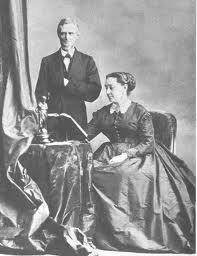 Varina began petitioning for her husband’s release and in May 1867, Jefferson Davis was released on bail of $100,000, which was posted by prominent citizens of both Northern and Southern states, including Horace Greeley, Cornelius Vanderbilt and Gerrit Smith. In December 1868, the court rejected a motion to nullify the indictment, but the prosecution dropped the case in February 1869. After his imprisonment, the couple lived apart for long intervals, with Varina spending time in Europe and Memphis. After several unsuccessful business ventures, Jefferson retired and accepted an invitation from Sara Dorsey, a widowed heiress, to visit her plantation of Beauvoir, near Biloxi, Mississippi. Here he began writing his two-volume memoir The Rise and Fall of the Confederate Government, which Varina later helped edit. After three years, the book was complete, but was never a financial success.
Varina began petitioning for her husband’s release and in May 1867, Jefferson Davis was released on bail of $100,000, which was posted by prominent citizens of both Northern and Southern states, including Horace Greeley, Cornelius Vanderbilt and Gerrit Smith. In December 1868, the court rejected a motion to nullify the indictment, but the prosecution dropped the case in February 1869. After his imprisonment, the couple lived apart for long intervals, with Varina spending time in Europe and Memphis. After several unsuccessful business ventures, Jefferson retired and accepted an invitation from Sara Dorsey, a widowed heiress, to visit her plantation of Beauvoir, near Biloxi, Mississippi. Here he began writing his two-volume memoir The Rise and Fall of the Confederate Government, which Varina later helped edit. After three years, the book was complete, but was never a financial success.
Jefferson Davis became deathly ill with what doctors diagnosed as acute bronchitis, complicated by malaria and died on December 6, 1889. Varina grieved in silence and made a move to New York where she began writing her memoirs of her husband. There, she enjoyed opera, theater, concerts, and the excitement of urban life.
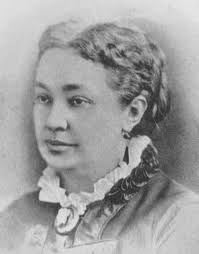 Varina’s life came to an end on October 16, 1906 after a bout of pneumonia. She was laid to rest next to her husband in Richmond, Virginia. The inscription on her headstone reads,
Varina’s life came to an end on October 16, 1906 after a bout of pneumonia. She was laid to rest next to her husband in Richmond, Virginia. The inscription on her headstone reads,
“Beloved and faithful wife of Jefferson Davis and devoted mother of his children. Her children raise up and call her blessed; her husband also and he praiseth her. She stretcheth out her hand to the poor; yes she reachest forth her hands to the needy. Give her of the fruit of her hands and let her own works praise her in the gates.”
Mississippi Queen, Varina Howell Davis, was not just a Bayou Beauty, she was a product of a time and place in the genesis of the United States, her legacy was her ability to adapt and her brilliance to survive and persevere.
Bummer


Didn’t the Davises lose one of their children during the war? I thought I’d seen before that like the Lincolns they had to deal with this sorrow in the midst of war. If so, did that change how Varina conducted her public role?
Louis,
They lost a son named Joseph, at five years old, in 1864. He died from an accidental fall. As can be expected, the event crushed the parents. Varina, who was always a fashion plate, wore a subdued black frock until much later in life. Other than the inward sorrow, Varina appears to have entertained and socialized as expected in her role as First Lady.
Bummer